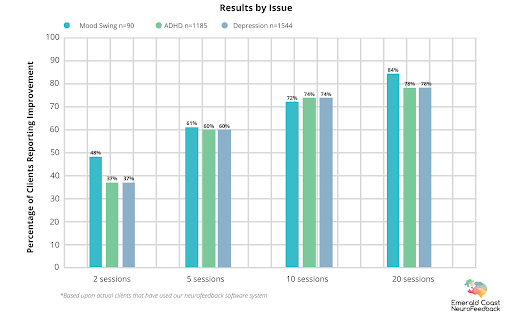
Personalized ADHD plans
ADHD, or attention-deficit hyperactivity disorder, is a behavior disorder most often characterized by impulsivity, inattention, and hyperactivity. It is currently estimated that nearly 12% of all children in the US have been diagnosed with ADHD. Emerald Coast NeuroFeedback can help people with ADHD develop personalized plans that train the brain to optimize how it is working.
Symptoms of ADHD
Symptoms of ADHD are generally separated into three categories: inattention, impulsivity, and hyperactivity.
Inattention
- Easily distracted
- Forgetfulness
- Poor listening skills
- Short attention span
- Lack of organizational skills
- Poor study skills for age
Impulsivity
- Often interrupts others
- Struggles to wait his or her turn
- Impulsively blurts out answers
- Takes frequent risks (often without thinking before acting)
Hyperactivity
- Seems to be in constant motion: runs or climbs – always moving
- Difficulty remaining seated
- Often fidgets with or taps feet/hands
- Talks excessively
- Has difficulty engaging in quiet activities
- Loses or forgets things repeatedly and often
- Inability to stay on task or complete any given task
Neurofeedback for Children with ADHD
The Neurofeedback approach for children with ADHD has produced significant improvements in ADHD symptoms after just eight to ten weeks. This method works by turning abnormal brainwave patterns into more typical, organized patterns through training and guided support.
Children with untreated ADHD often experience trouble learning, fall behind in school, and receive poor grades. They may struggle to control their emotions, leading to anger, aggression, and outbursts. Social problems, such as an inability to share toys, play with others, or make and keep friends, are common. Additionally, children may suffer from low self-esteem and confidence and have more visits to the emergency room due to injuries.
Teenagers with untreated ADHD may struggle with friendships and dating relationships. They often experience low self-esteem, depression, and difficulty in getting along with their parents. There is an increased risk of engaging in dangerous behaviors, such as alcohol, drugs, and risky sexual activities. They may also be involved in more road accidents.
Maintaining Brain Stability
Neurofeedback training focuses on maintaining brain stability. It is typical for those experiencing ADHD to have a brain that is running too slowly. This is why stimulant medications are often a treatment for ADHD. With Neurofeedback, we can teach the brain to speed itself up naturally. This can address a wide range of ADHD symptoms, including impulse control, attention, focus, and even overall mood.
Emerald Coast NeuroFeedback has demonstrated significant improvements in symptoms of ADD and ADHD after just eigth to ten weeks.
Our Neurofeedback Process
Our Neurofeedback process features four essential stages designed to identify problem areas and train the brain to better manage those problems, such as symptoms associated with ADHD, among other conditions.
Our initial evaluation is a 90-minute exam in which our therapist and software system will generate a protocol best suited for your unique needs, identifying symptoms, goals and areas for growth.
Advantages of Neurofeedback
The primary advantage of Neurofeedback is its safe and lasting approach to brain training.
- The brain teaches itself to change
- Neurofeedback is non-invasive and uses the brain's natural learning ability
- No harmful side effects
- Long-lasting results

Traditional Treatments and Medication
Traditional approaches to ADHD often involve stimulant medication. Neurofeedback, however, offers an alternative or complement to medications. In some cases, Neurofeedback can replace the need for medication entirely, depending on the individual. Medication is designed to treat symptoms, not to address the underlying causes of ADD/ADHD. While stimulant medication can significantly improve symptoms for some, others may experience unwanted side effects or find it ineffective. Additionally, medication does not teach the brain to function differently, meaning that once the medication is stopped, the brain often reverts to its original patterns.
* It's essential to talk with your doctor/medical provider before making changes to any current medications.
Getting Started with Emerald Coast NeuroFeedback
To get started with Neurofeedback brain training, reach out to our team for coaching and guidance. We can develop a personalized plan that addresses the symptoms of ADHD. When your brain is trained to function optimally, life improves! Contact us today to learn more or schedule an appointment for an evaluation.
